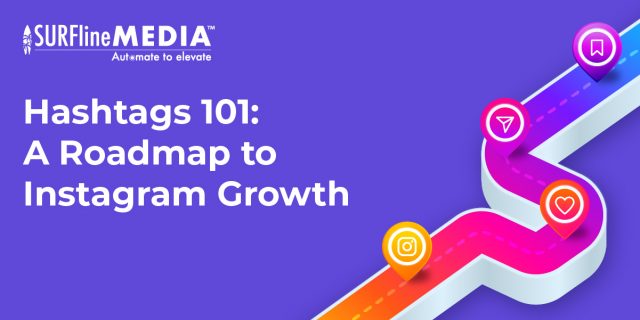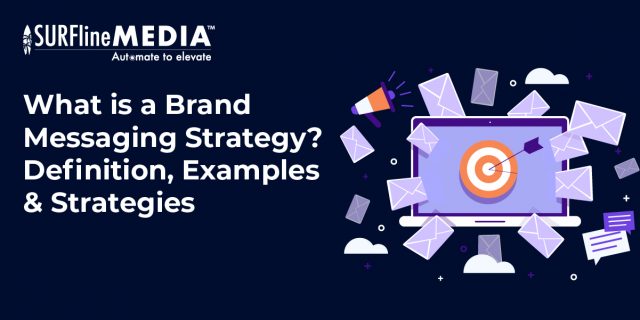
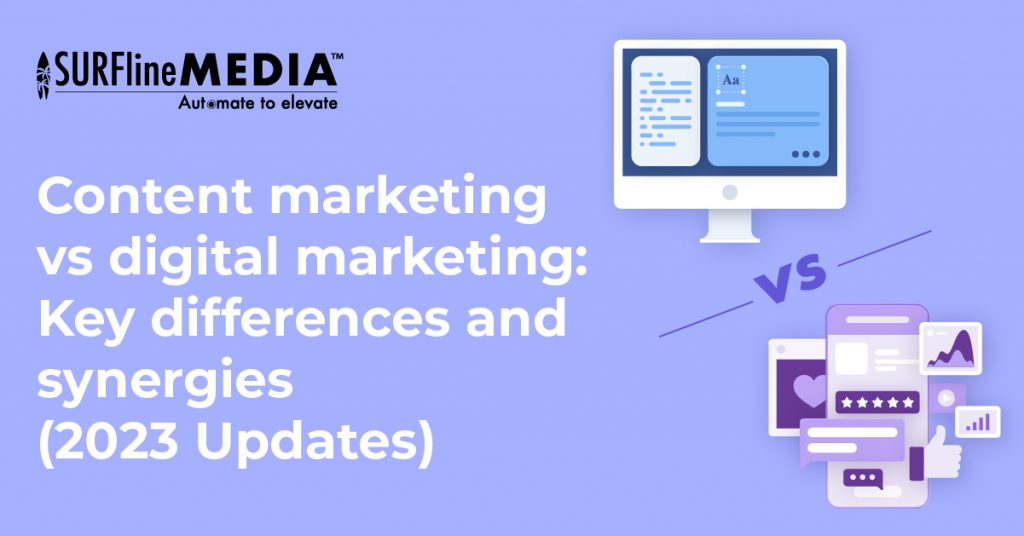
- August 4, 2023
- 4:00 pm
- No Comments
Content Marketing vs Digital Marketing: Key Differences and Synergies
In today’s ever-changing digital landscape, businesses face the challenge of effectively reaching and engaging their target audiences. Content marketing vs digital marketing are two powerful strategies that, when seamlessly integrated, can propel brands to new heights of success.
In this blog, we will delve into the distinct yet complementary roles of these approaches, understanding how content marketing creates valuable and compelling content to connect with audiences, while digital marketing strategically promotes that content across various online channels.
Content Marketing vs Digital Marketing: What is Content Marketing?
Content marketing is a strategic approach to digital marketing. It revolves around creating, publishing, and distributing engaging content to attract and retain a target audience. Unlike traditional advertising, content marketing seeks genuine connections with consumers through informative, entertaining, or educational material that addresses their needs and interests.
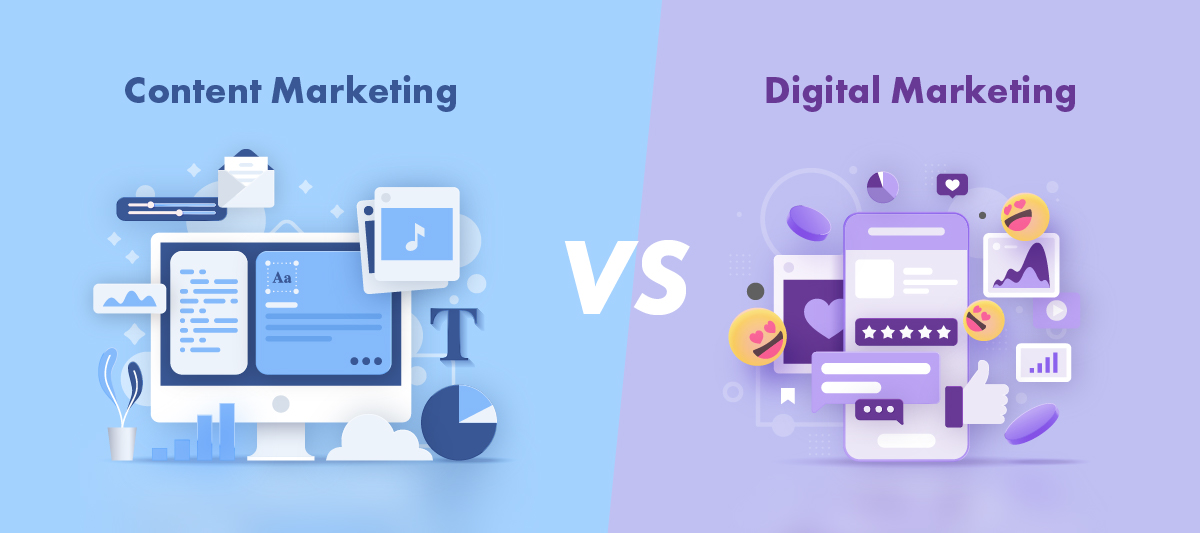
At its core, content marketing aims to build brand awareness, credibility, and trust. It positions the brand as an authoritative resource within its industry. By delivering high-quality content consistently, content marketers aim to foster a loyal following and convert prospects into loyal customers.
Content marketing doesn’t solely focus on promotion or sales pitches. Instead, it provides value first, knowing consumers engage more with a brand that contributes genuinely to their lives. Through strategic content distribution on channels, content marketing creates meaningful interactions with the audience, fostering long-term relationships for business growth.
Content Marketing vs Digital Marketing: What is Digital Marketing?
Digital marketing refers to advertising, promoting, and selling products using various digital channels. It utilizes the internet and electronic devices to reach a global audience in a targeted and measurable manner.
This form of marketing leverages online platforms like search engines, social media, email marketing, content marketing, and more. Its primary goal is to connect businesses with potential customers in the digital realm. Through digital marketing, companies can deliver personalized messages to specific audiences based on demographics, interests, and behavior. Real-time feedback and data analysis enable continuous optimization of strategies.
Digital marketing is vital for modern business, providing a cost-effective and efficient means of brand promotion and customer acquisition. Its adaptability to technology and consumer trends ensures competitiveness in the digital age.
Key differences between Content Marketing vs Digital Marketing
Key Differences | Content Marketing | Digital Marketing |
Focus and Purpose | Establishing brand authority and building long-term customer relationships through valuable content. | Connecting businesses with potential customers in the digital realm and optimizing campaigns for lead generation and sales. |
Approach and Strategy | Consumer-centric approach, focusing on creating valuable content to emotionally connect with the audience. | Data-driven approach, targeting specific demographics through various digital channels and optimizing strategies based on analytics. |
Content-Centric | Primarily relies on high-quality and relevant content, such as blogs, articles, videos, infographics, etc. | Utilizes multiple digital channels like search engines, social media, email, display ads, etc., to distribute content and engage with the audience. |
Long-term vs. Short-term Results | Emphasizes long-term brand building and fostering loyalty, with results visible over time. | May include both long-term brand building and short-term promotional campaigns to achieve immediate results. |
Components (Landscape) | Involves content creation, curation, distribution, and engagement to establish thought leadership. | Comprises various components like search engine optimization (SEO), social media marketing, email marketing, pay-per-click (PPC) ads, and more. |
Focus & Purpose
Content marketing and digital marketing have distinct focuses and purposes. Content marketing revolves around establishing brand authority and fostering long-term customer relationships through valuable content.
The primary aim is to provide informative material that engages the audience, positioning the brand as a trustworthy source. In contrast, digital marketing is centered on connecting businesses with potential customers in the online space. It emphasizes optimizing digital campaigns for lead generation, leveraging various channels like social media, search engines, email marketing, and more.
Approach & Strategy
Content marketing adopts a consumer-centric approach, focusing on creating valuable and relevant content to emotionally connect with the audience. The goal is to engage and resonate with customers, building trust and loyalty over time. Conversely, digital marketing takes a data-driven approach, leveraging analytics to target demographics through digital channels like search engines and email marketing.
Content-Centric
Content marketing relies on creating high-quality content such as blogs, articles, videos, and infographics. The focus is on delivering valuable information, establishing brand authority, and fostering meaningful connections.
Digital marketing utilizes vs channels like social media, email, and display ads to distribute content and engage the audience. The emphasis is on maximizing content reach and visibility to drive traffic, generate leads, and boost sales.
Long-term vs. Short-term Results
Content marketing puts a strong emphasis on long-term brand building and fostering customer loyalty. The results from content marketing efforts may take time to materialize as it involves establishing trust with the audience.
Meanwhile, digital marketing encompasses a broader spectrum. It includes both long-term brand building strategies and short-term promotional campaigns aimed at achieving immediate results. Digital marketing leverages various tactics like pay-per-click (PPC) advertising and time-sensitive promotions to generate quick conversions and drive instant engagement.
Components
Content marketing involves a holistic approach, encompassing content creation, curation, distribution, and active audience engagement to establish thought leadership. It revolves around providing valuable and informative content to attract and retain customers, nurturing long-term relationships.
Oppositely, digital marketing comprises a diverse array of components like SEO, social media marketing, email marketing, PPC ads, and more. These components connect businesses with potential customers in the digital realm, optimizing campaigns for lead generation and instant engagement.
Synergies between Content Marketing vs Digital Marketing
How Content Marketing Enhances Digital Marketing Efforts
Without either content marketing or digital marketing, businesses can’t build a winning full-funnel marketing strategy.
Content marketing is a pivotal strategy that significantly enhances digital marketing efforts. In the fast-paced digital landscape, where consumers are bombarded with advertisements and promotional messages, content marketing stands out as an effective approach to engage, educate, and connect with the target audience.
Firstly, content marketing creates valuable and relevant content that appeals to the interests and needs of the audience. By producing high-quality articles, blogs, videos, infographics, and more, businesses can establish themselves as industry authorities, building trust and credibility among consumers. This, in turn, fosters long-term relationships with the audience, leading to increased brand loyalty and customer retention.
Secondly, content marketing plays a crucial role in search engine optimization (SEO). Search engines prioritize websites with valuable, fresh, and informative content, boosting their visibility in search results. As a result, content marketing drives organic traffic, attracting potential customers who are actively seeking relevant information.
Furthermore, content marketing seamlessly integrates with various digital marketing channels, such as social media, email marketing, and influencer collaborations. Engaging content sparks discussions, encourages social sharing, and drives user interaction, amplifying the reach and impact of digital marketing campaigns.
How Digital Marketing Amplifies Content Marketing Reach
Digital marketing serves as a powerful amplifier for content marketing, significantly expanding its reach and impact. Through various digital channels and tactics, content can be strategically promoted and distributed to a wider audience, ensuring maximum visibility and engagement.
Firstly, social media platforms play a crucial role in amplifying content marketing efforts. Sharing content on popular social networks like Facebook, Twitter, Instagram, and LinkedIn allows businesses to tap into vast user bases and reach potential customers across the globe. Moreover, social media encourages content sharing and virality, enabling organic growth and exposure to an even broader audience.
Secondly, email marketing campaigns serve as effective tools for distributing content directly to subscribers and interested parties. By segmenting email lists and tailoring content to specific target groups, businesses can provide personalized and relevant information, increasing the likelihood of conversion and customer retention.
Thirdly, search engine marketing (SEM) and pay-per-click (PPC) advertising allow businesses to promote their content to users actively searching for related topics. This targeted approach ensures that content reaches individuals with specific interests, leading to higher engagement rates and more qualified leads.
Additionally, collaborations with influencers and content partnerships can amplify content reach to niche audiences that might otherwise be challenging to access. By leveraging influencers’ followers and established networks, businesses can extend their content’s reach and credibility.
Furthermore, data-driven strategies, such as retargeting and remarketing, enable brands to re-engage users who have previously interacted with their content, reinforcing the message and encouraging conversions.
Real-life Case Studies of Successful Integration
GoPro’s Adventure-Fueled Content Marketing
GoPro, the action camera company, is renowned for its adventure-driven content marketing strategy, showcasing thrilling user-generated videos and photos captured with their cameras. By leveraging the power of user-generated content, GoPro successfully integrates content marketing with digital marketing to reach and engage their target audience.
GoPro encourages their customers, a community of passionate adventurers and adrenaline enthusiasts, to share their action-packed experiences on social media using the hashtag #GoPro. They curate and feature the best content on their website and across their social channels, turning customers into brand advocates and ambassadors.
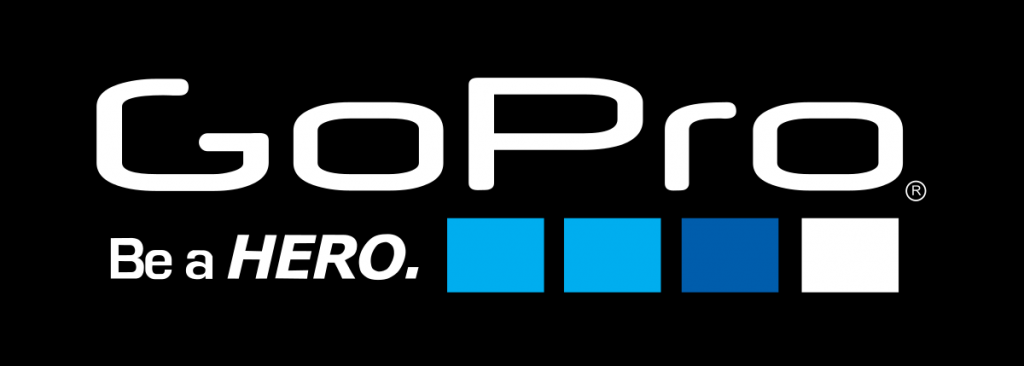
Digital marketing plays a vital role in amplifying GoPro’s content reach. Through strategic partnerships with social media influencers, athletes, and extreme sports enthusiasts, they expand their content’s exposure to a wider audience. GoPro also runs targeted online ad campaigns, reaching potential customers with a penchant for adventure and outdoor activities.
By fostering a sense of community, inspiring creativity, and showcasing thrilling user experiences, GoPro’s integration of content marketing with digital marketing has contributed significantly to their brand’s global success.
Patagonia’s Environmental Advocacy Content
Patagonia, an outdoor apparel and gear company, has successfully integrated content marketing with digital marketing to promote its environmental advocacy and sustainable initiatives.
Patagonia’s content marketing revolves around powerful storytelling that aligns with their brand values and mission. They produce engaging blog posts, videos, and documentaries that shed light on environmental issues and inspire positive change. Their “Worn Wear” campaign, for example, encourages customers to repair and reuse their gear, reducing waste and promoting sustainability.

Through digital marketing efforts, Patagonia maximizes the impact of their content. They leverage social media platforms to raise awareness about environmental concerns, sharing stories that resonate with their eco-conscious audience. Patagonia’s advocacy campaigns often go viral, attracting media attention and expanding their reach.
In addition to promoting their initiatives through content, Patagonia encourages user engagement through calls-to-action, inviting customers to participate in environmental initiatives and support causes they care about. Their digital marketing strategies effectively amplify these calls-to-action, driving community engagement and fostering a loyal customer base.
Conclusion
While content marketing focuses on creating valuable and engaging content to connect with the audience and build brand authority, digital marketing encompasses various strategies and channels to promote that content and reach a wider audience. The integration of these two powerful approaches can lead to remarkable results, driving brand awareness, engagement, and customer loyalty.
As a leading digital marketing agency, we at Surfline Media understand the significance of this synergy. We specialize in providing effective Content Marketing services that resonate with audiences and align with the broader goals of digital marketing, helping many small businesses win their customer. Contact us now!
_______________________

Surfline Media – Automate to Elevate
Our website: https://surflinemedia.com/
Contact us: https://surflinemedia.com/contact-us/
Phone number: +1 323-741-4482
Email: [email protected]

